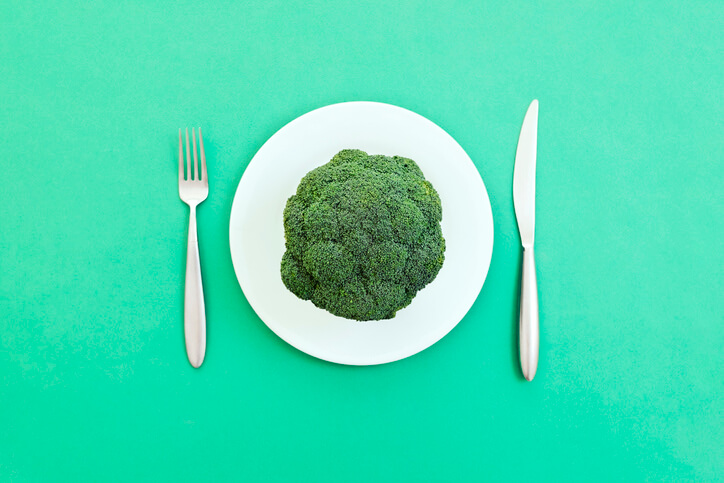Yet Another Reason to Pile Your Plate With Broccoli
6 years ago | Nutrition
By Joy Stephenson-Laws, JD, Founder
We all need the nutrients found in broccoli for proper body functioning and our wellbeing. Broccoli contains nutrients, such as fiber, calcium, magnesium, phosphorus, potassium, vitamin C, vitamin A and folate. These nutrients are necessary to help our bodies fight off diseases such as depression, dementia, heart disease, diabetes and cancer.
Broccoli may even help improve our gut health, and many medical professionals believe that a healthy gut is the foundation to overall health and the key to preventing chronic disease.
If you are still not tempted to run to the grocery store and stock up on broccoli, also know that broccoli contains sulforaphane (SFN) which has proved to be “an effective chemoprotective agent in cell culture, in carcinogen-induced and genetic animal cancer models, as well as in xenograft models of cancer,” according to the National Institutes of Health (NIH).
“Overall, SFN appears to be an effective and safe chemopreventive molecule and a promising tool to fight cancer.”
Some studies even suggest that broccoli may lower lung cancer risk in smokers!
And now, a recent study revealed that there is a natural compound present in broccoli that appears to reawaken the function of a potent tumor suppressor, according this report discussing the study.
What’s even better is that other cruciferous vegetables, including cauliflower, kale, cabbage, collard greens, and Brussels sprouts, contain this natural compound as well.
"We found a new important player that drives a pathway critical to the development of cancer, an enzyme that can be inhibited with a natural compound found in broccoli and other cruciferous vegetables," said one of the lead researchers.
“This pathway emerges not only as a regulator for tumor growth control, but also as an Achilles' heel we can target with therapeutic options."
Researchers of the study experimented with cancer prone mice and human cells.
And, “...the team revealed that a gene called WWP1—which is also known to play a role in the development of cancer—produces an enzyme that inhibits PTEN's tumor suppressive activity.”
PTEN is a gene known for its ability to impede tumor growth, however, the study report says that it is one of the most frequently mutated, deleted, down-regulated or silenced tumor suppressor genes in human cancers.
But the compound, called indole-3-carbinol (I3C), naturally present in broccoli and other cruciferous vegetables appears to unleash the “PTEN kryptonite.”
There are also supplements available that contain I3C, but, as always, it is imperative to seek the advice of a competent healthcare professional before you implement any form of supplementation into your proactive healthcare routine.
The Memorial Sloan Kettering Cancer Center states that I3C “...is known to stimulate detoxifying enzymes in the gut and liver. Because diets high in these vegetables slow cancer growth in animals, I3C is thought to be a good candidate for cancer prevention. Laboratory studies show that I3C may have anticancer activities across a variety of tumor types, and may have added benefit with some chemotherapy drugs.”
But at the same time, “...other animal studies suggest that I3C might also promote tumor growth. Additional studies and human clinical trials are needed to determine the circumstances under which I3C might be suitable for cancer prevention.”
This isn’t to say that eating broccoli and other cruciferous vegetables will cause cancer. (It’s actually processed, proinflammatory foods that may cause cancer). It’s just that every cancer case is different, and more research is needed to specifically target how I3C can be beneficial to every cancer case. Perhaps ingesting too much I3C may have a counter effect and actually promote tumor growth. Remember, too much of a good thing can be just as bad as not having enough of something that is good for you.
The report discussing the study says that the next step for the researchers is to figure out exactly how they can leverage their discovery, because one would actually have to eat about, for example, six pounds of raw (yes, raw) Brussels sprouts to reap the benefit of the anti-cancer compound.
Clearly, the main takeaway from this study is that nutrient-dense foods, like vegetables, may be good for our health. Moreover, we can be proactive and take control of our health by fueling our bodies with these nutrient-rich, anti-inflammatory foods.
Even though it’s not my favorite vegetable, I will continue to eat broccoli. And I’m happy to know I can still get the same potential benefits from other cruciferous veggies, like cauliflower and kale, which I actually really enjoy eating.
If you are not much of a vegetable eater, I hope this information inspires you to make the effort to eat more green leafy vegetables on a daily basis and discover vegetables you actually enjoy eating.
Need even more inspiration? Check out these pH Labs blogs about vegetables that contain easy, delicious recipes and a wealth of information about how these foods can be beneficial to your health.
Enjoy your healthy life!
The pH professional health care team includes recognized experts from a variety of health care and related disciplines, including physicians, attorneys, nutritionists, nurses and certified fitness instructors. This team also includes the members of the pH Medical Advisory Board, which constantly monitors all pH programs, products and services. To learn more about the pH Medical Advisory Board, click here.







